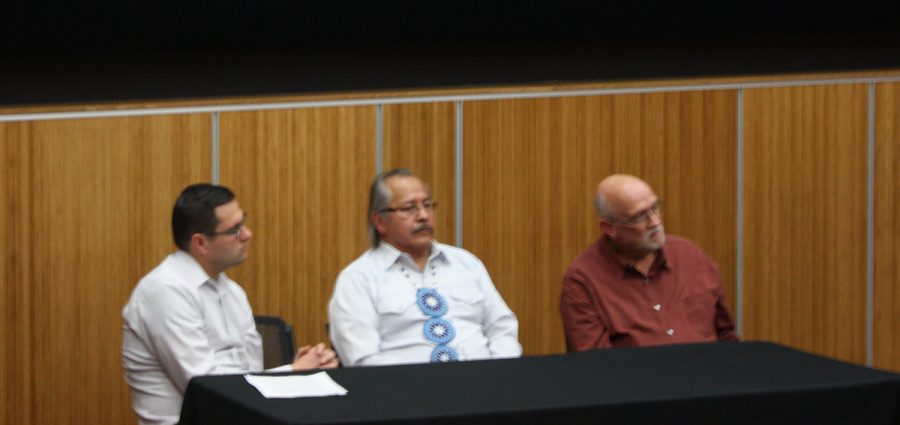North Dakota Access Pipeline brings different perspectives to campus
Native American Heritage Month invites speakers for a panel discussion
More stories from Elizabeth Gosling
Photo by Elizabeth Gosling
The North Dakota Access Pipeline conversation came to campus with a panel of American Indian Studies lecturers, an environmental historian and the president of the Ho-Chunk Nation on Monday.
The North Dakota Access Pipeline (DAPL) conversation is a hot topic in the United States and has been the cause of more than 7,000 people going to Cannon Ball, North Dakota to protest and support the Standing Rock Sioux Native American tribe.
As part of Native American Heritage Month, a panel discussion organized by the Intertribal Student Council took place at 5 p.m. this past Monday to acknowledge the controversy and provide varied opinions from the Eau Claire and Chippewa communities.
Savannah Rigert, president of the organization, said events like the No DAPL discussion and other Native American Heritage Month events represented her culture and made it possible for the culture to come together and support each other.
The pipeline plan involves 1,170 miles of drilling across the Midwest, including both Dakotas, Iowa and Illinois. More than 400,000 barrels of oil would be transported through the line, resulting in less oil being imported from other countries.
In North Dakota, the pipeline goes two miles through the Great Sioux Reservation. Pipeline construction would damage sacred sites and relocate graves to the Arlington National Cemetery. A potential oil spill could pollute the Native Americans’ water supply.
The three speakers at the event included Robert Bell, UW-Eau Claire associate professor in American Indian Studies and expert on 19th century treaty agreements; David Soll, assistant professor at the Watershed Institute for Collaborative Environmental Studies and environmental historian; and Wilfrid Cleveland, president of the Ho-Chunk Nation.
The night began with a video blog from a young Dakota tribe member on his journey with his aunts to the Standing Rock Sioux Reservation. The video highlighted many of the events that took place over a weekend; tribes came from around the nation to show their support through ceremonies and prayers.
Following the video, each speaker addressed a different point of view. Bell addressed the history of the Standing Sioux Rock tribe and the Great Sioux Reservation.
Bell referred to the Fort Laramie Treaty that was signed between the U.S. and the Sioux in 1868.The treaty protected the tribe’s land indefinitely under the Federal Government.
Next, Soll addressed the environmental impact of the pipeline as well as the motivations of early politicians like Andrew Jackson. The government was interested in the farmland and coincidentally, the government is using the same methods for energy.
Cleveland closed the discussion by sharing his own experiences at the No DAPL site in Cannon Ball.
As the president of the Ho-Chunk Nation, he said the only thing the Native Americans have to combat this controversy are their ceremonies and prayers. He said they trust these methods to overcome the struggles the pipeline brings.
No DAPL Concerns
President Obama halted progress on the pipeline and after U.S. District Judge James Boasberg ruled construction may continue in all but one area. More people have congregated to support the movement against the pipeline.
Earlier in the year, Northwestern United States militants opposed the government with rifles and were acquitted after a standoff and seizing control of a Wildlife Refuge in Oregon, according to an article from MSNBC.
However, a video from The Guardian revealed more than 20 people were arrested and raided with pepper spray in a police raid during a prayer ceremony at Sacred Stone Camp in Cannon Ball
“My question is,” Cleveland said, “Why? Who authorizes these things to happen?”











